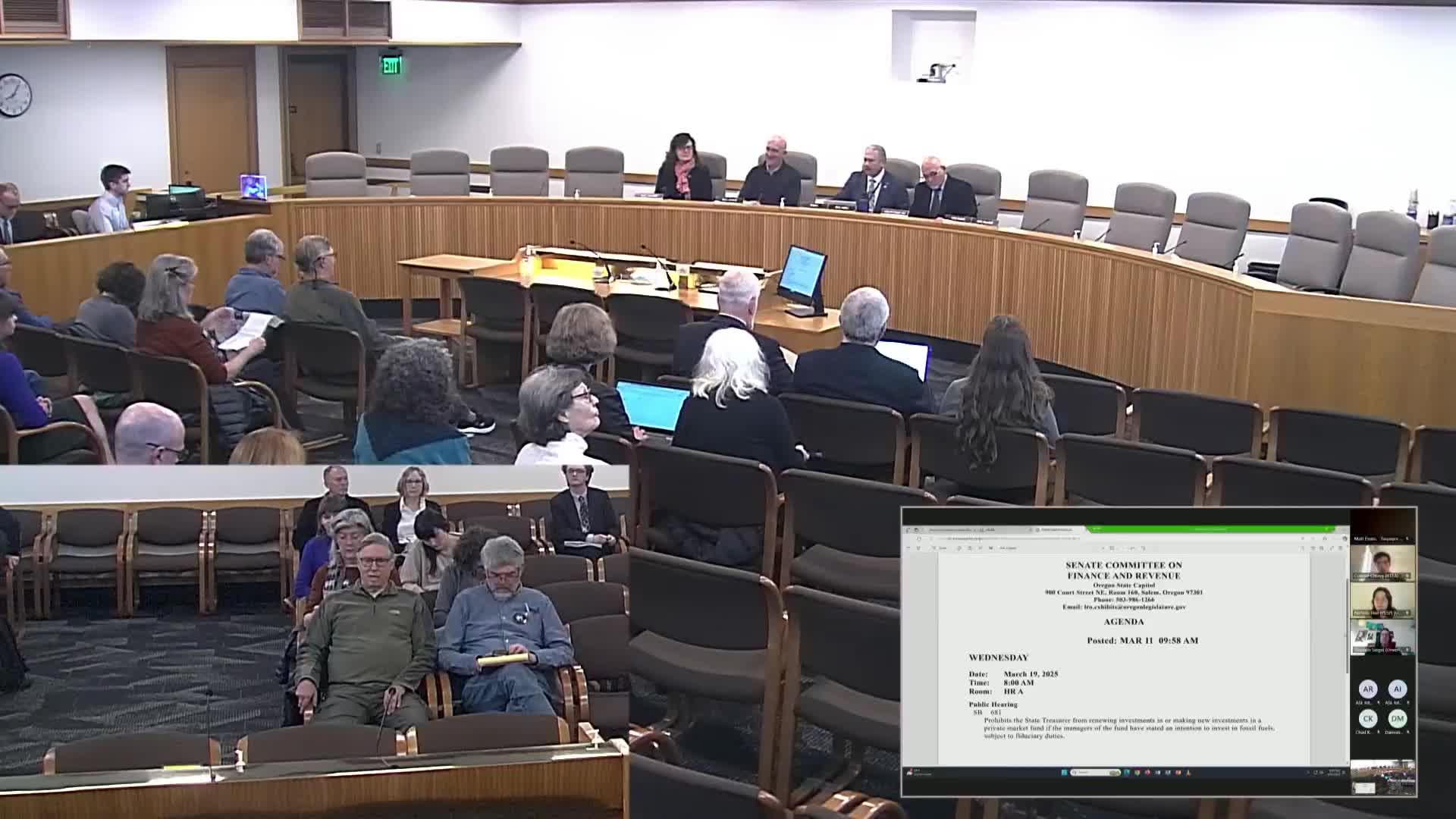Senate Finance and Revenue Committee holds hearing on bill to pause new private-market fossil fuel investments
Get AI-powered insights, summaries, and transcripts
Subscribe
Summary
The Senate Committee on Finance and Revenue opened a public hearing on Wednesday, March 19, 2025, on Senate Bill 681, which would bar the state treasurer from making new or renewed commitments to private-market funds if the fund managers have stated an intention to invest in fossil fuels.
The Senate Committee on Finance and Revenue opened a public hearing on Wednesday, March 19, 2025, on Senate Bill 681, which would bar the state treasurer from making new or renewed commitments to private-market funds if the fund managers have stated an intention to invest in fossil fuels. The bill’s principal sponsors, Sen. Jeff Golden and Rep. Mark Gamba, joined a series of proponents and opponents who testified during the hearing; no committee vote was taken.
Supporters told the committee the moratorium is a measured step to implement the state treasurer’s Pathway to Net‑0 and to reduce climate‑related financial risk inside the Oregon Public Employees’ Retirement Fund (PERS). Sen. Jeff Golden said the bill follows the treasurer’s plan and “Stop[s] digging,” arguing that the state should pause new long‑term commitments that lock capital into fossil fuel projects. Rep. Mark Gamba said he “strongly support[s] SB 681” and described private market commitments as large, long and opaque contracts that can expose pension beneficiaries to climate and financial risk.
Proponents — including nonprofit advocates, union representatives and independent analysts — cited several concerns they said justify a pause. Testimony reflected three recurring points: private market allocations at the Treasury have grown substantially and concentrate emissions in the portfolio; private funds are often long‑term, illiquid commitments with limited public disclosure; and fossil‑fuel assets face structural market declines and volatility that can create financial downside for long‑term investors.
Speakers who provided specific figures told the committee that private market investments have grown to roughly half or more of the pension portfolio. For example, several witnesses said private investments now approach about 50–60% of certain asset classes in the fund (figures given during testimony varied by speaker). Divest Oregon and others cited the Treasury’s net‑zero analysis showing a large share of baseline emissions is in private investments and recommended a five‑year moratorium to allow time for portfolio rebalancing and implementation of the treasurer’s net‑zero goals.
Financial and technical witnesses framed the pause as a risk‑management step rather than an immediate sale of existing assets. Philip Carver, a former Oregon Department of Energy and PUC economist, described the long lead times and volatile markets for energy infrastructure and warned that changing markets can make such projects economically risky. Connor Chung of the Institute for Energy Economics and Financial Analysis said the fossil‑fuel sector has shrunk as a share of public benchmarks and that several institutional peers have adopted private‑market limits without sacrificing returns.
Opponents, including business groups and some unions, urged caution or opposed the bill outright. Derek Sangston of Oregon Business and Industry said SB 681 would “impose requirements on the state treasurer and the Oregon Investment Council that [are] inconsistent with its role as the state’s fiduciary,” and argued the statute directing prudent management (cited during testimony as ORS 293.726) already requires consideration of climate‑related risk. Matt Evans of the Taxpayer Association of Oregon and representatives of labor unions raised concerns that restricting investment choices could hinder the fund’s ability to meet its long‑term liabilities and that fiduciary obligations could be compromised if investment managers are directed to prioritize non‑financial goals.
Several witnesses asked for a collaborative process. Union witnesses said they shared the goal of reducing climate risk but urged coordination with the new treasurer’s implementation plan and ongoing legislation (witnesses referenced past and pending bills such as House Bill 2200 and other net‑zero efforts). Chair Meek said he would speak with stakeholders and encouraged parties to seek compromises that might broaden support or produce neutral language.
The committee closed the public hearing without a vote. Chair Meek said the treasurer opposes the bill as written but indicated willingness to meet with stakeholders to discuss potential changes. The committee scheduled its next meeting for 8:00 a.m. Monday, March 24, 2025.
Notes on testimony and process: witnesses described SB 681 as a moratorium (not forced divestment) on new or renewed private‑market investments tied to managers who state an intention to invest in fossil fuels; several speakers clarified the bill would not require the sale of existing fossil‑fuel holdings. Testimony included claims about portfolio composition, emissions attribution to private markets, and fiduciary obligations; figures cited in testimony varied by speaker and are reported here as stated by those speakers.
